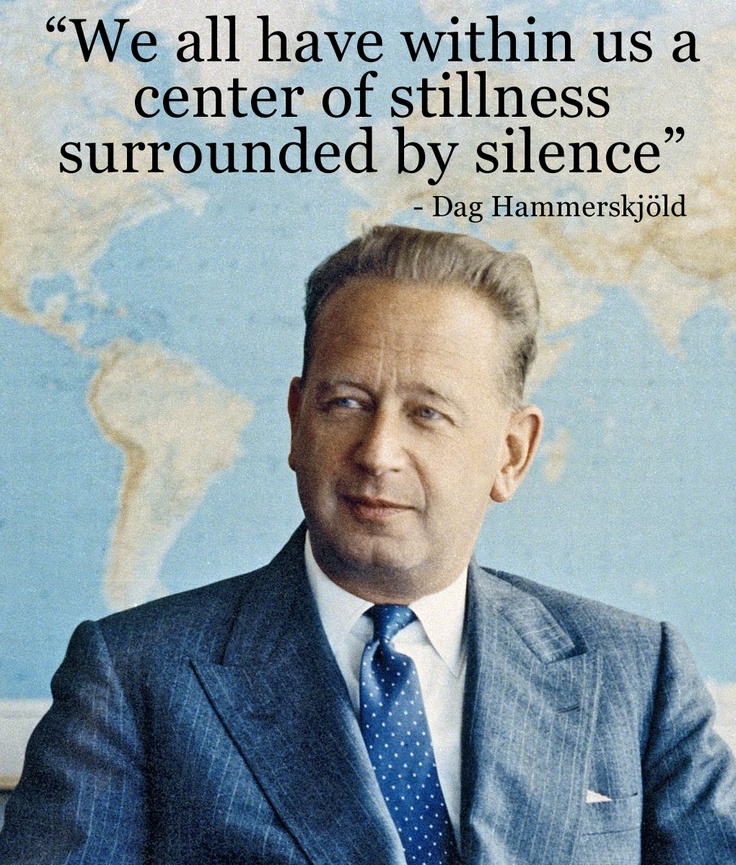Today's post is the All Saints Day message to the Professed Members of the Order of the Ascension by Michelle Heyne, OA. Michelle is the Presiding Officer of OA.

I was saying Morning Prayer and reading the Litany of the Saints a bit ago. This entry particularly grabbed my attention:
Dag Hammarskjold the bureaucrat; all who made governance an act of faith... (I've included a quote from him at the end of this message.)
It's rare that a person in an explicitly secular role is held up as an example of holiness (Frances Perkins also comes to mind). I particularly loved the juxtaposition of the words "bureaucrat" and "governance" with "act of faith." It is exactly this sort of plain, day-to-day action that the vast majority of us find ourselves in and it takes a well-developed capacity for reflection to recognize our daily work as a primary way in which we are the light of Christ.
I led the Diocese of New York's Clergy Day a couple of weeks ago. The topic was ostensibly "dealing with difficult people." It was really about how to reorient the parish around a shared understanding of purpose: the worship of God and the spiritual formation of God's people.
We talked about the ways that difficult behavior can be transformed by (1) effectively using the power of the clergy to shape a community of faith in specific ways grounded in our tradition; and (2) helping the community develop its capacity to listen and respond to the realities of the world we are in, both corporately and in daily life.
This seems to me a central offering of the church to its members, but one we don't seem to engage very well: Helping parishioners understand the connection between worship and community life, and their own decisions and actions.
How do we vote in a way that takes our faith seriously and considers complex dependencies and consequences? How do we effectively use our individual power and influence to support justice and mercy in the society at large, not only through interpersonal kindness? How do we each foster humane and effective workplaces while being realistic about the roles from which we actually come?
These actions are truly the saints at work and our parishes can and must get much better at creating space for reflection and other applicable skills, while continuing to ground parish life even more purposefully in prayer and the community of the Trinity.
The unifying of the personality, the integration of mind and heart into one center.
Kenneth Leech
Here's a quote from Hammarskjöld, that strikes me as deeply individualistic (perhaps troubling so) and sees faith as secular life as inseparable:
In 1953, soon after his appointment as United Nations Secretary-General, Hammarskjöld was interviewed on radio by Edward R. Murrow. In this talk Hammarskjöld declared:
But the explanation of how man should live a life of active social service in full harmony with himself as a member of the community of spirit, I found in the writings of those great medieval mystics [Meister Eckhart and Jan van Ruysbroek] for whom 'self-surrender' had been the way to self-realization, and who in 'singleness of mind' and 'inwardness' had found strength to say yes to every demand which the needs of their neighbours made them face, and to say yes also to every fate life had in store for them when they followed the call of duty as they understood it.[20]
Michelle Heyne, OA
 I was saying Morning Prayer and reading the Litany of the Saints a bit ago. This entry particularly grabbed my attention: Dag Hammarskjold the bureaucrat; all who made governance an act of faith... (I've included a quote from him at the end of this message.)
I was saying Morning Prayer and reading the Litany of the Saints a bit ago. This entry particularly grabbed my attention: Dag Hammarskjold the bureaucrat; all who made governance an act of faith... (I've included a quote from him at the end of this message.)